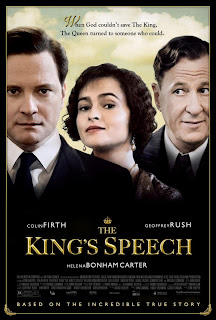 The paisa vasool sequence in The King’s Speech, the last year’s best film if you believe Uncle Oscar, comes towards the end. Bertie’s father is dead, his brother has abdicated the throne and now, he becomes King George, a grim prospect since it would require, among other things, public speaking. So, he visits the clinic of Lionel Logue again (the doctor and the patient have already gone through a tumultuous relationship), an Australian speech therapist with unorthodox methods of treating stammering. Logue makes a formal appointment; it’s one thing meeting the Duke of York and quite another meeting the King of England, practically the ruler of the half the world.
The paisa vasool sequence in The King’s Speech, the last year’s best film if you believe Uncle Oscar, comes towards the end. Bertie’s father is dead, his brother has abdicated the throne and now, he becomes King George, a grim prospect since it would require, among other things, public speaking. So, he visits the clinic of Lionel Logue again (the doctor and the patient have already gone through a tumultuous relationship), an Australian speech therapist with unorthodox methods of treating stammering. Logue makes a formal appointment; it’s one thing meeting the Duke of York and quite another meeting the King of England, practically the ruler of the half the world. On the appointed day, Logue nervously invites the king and queen. He has sent his wife and sons away. As they stand there uncomfortably, Queen Elizabeth invites herself to sit on the dinning table and sends her husband and the doctor to discuss the matter at the doctor’s visitor’s room.
A while later the doctor’s wife, Myrtle, returns home. She enters the house, and cannot believe that the queen of England is sitting on her dinner table. It’s not a very good idea. She bows, and mumbles: “Milady.”
The queen, ever the resourceful, takes care of the situation with grace and poise. She tells Mrs Logue: "Your Majesty", the first time. After that, "Ma'am". Not Malm as in Palm, Mam as in ham. I'm informed your husband calls my husband Bertie and my husband calls your husband Lionel. I trust, however, you won't attempt to call me Liz.
Myrtle bows and says: “You can call me Madam Logue.” She has no idea what else to do. Both are ill at ease.
Hearing them speak, in the other room, Lionel is nervous again. The king asks what was the matter with him. Lionel says: “I haven’t told her about us.”
Now, this one sentence is loaded with meanings, even without the context. In the context of the film, however, there are several things going on. The relationship between the doctor and king the patient is not exactly smooth. The doctor demands Bertie to do things which is very demeaning for a royalty, no less the king. Queen Elizabeth is very unhappy about how her husband is treated. On the other hand, Myrtle is worried that if Lionel goes on doing his practice, one day he might end up in jail or be dead.
Now, Bertie urges him to face the situation. Lionel nervously enters the other room, kisses his wife on the cheek and introduces her to the king. Myrtle bows. As they stand there awkwardly, Myrtle asks: “Would their Majesties be staying for dinner?”
Lionel is horrified with the idea. You cannot invite the king for a dinner. The king is uncomfortable. The queen comes to rescue again, as she answers curtly: “We would love to, such a treat, but alas... a previous engagement. What a pity.”
 The way Helena Bonham Carter plays the queen, it underlines a major theme of the film, the changing traditions, and class consciousness. The queen understands that the dividing line that separates between the royalty and the commoners is diminishing. Hence, she had come alone to seek the help of the doctor, that too an Australian. Yet, she knows where to draw the line. Despite everything, she is still the queen. She would go to any extent to help her husband, yet, she would continue to uphold the demands of royalty.
The way Helena Bonham Carter plays the queen, it underlines a major theme of the film, the changing traditions, and class consciousness. The queen understands that the dividing line that separates between the royalty and the commoners is diminishing. Hence, she had come alone to seek the help of the doctor, that too an Australian. Yet, she knows where to draw the line. Despite everything, she is still the queen. She would go to any extent to help her husband, yet, she would continue to uphold the demands of royalty. Perhaps this one of the reasons why the film has been so popular. The film underlines that in the brink of the modern age, being a royalty is no longer fun. It’s far easy to be a common man than be a king, especially when you don’t have much power, anyway (Mr Churchil being the most powerful man.) Early in the film, Bertie’s father King George, playing by Michael Gambon with an exaggerated charm, tells his son: “Earlier, all a king was required to do was to sit on a horse and look good. Now, you have to speak on the radio and reach to people’s drawing rooms.”
Yet, the best parts of the film are those involving Bertie and Lionel as they help each other find their feet in the world (Not to mention the flow of f-words... and how Colin Firth’s King relishes uttering the words.)
(Just wondering: Isn’t the story of King Edward VIII, who abdicated his throne to be with his lover, an American divorcee, fantastic fodder for a Hollywood spectacle?)
No comments:
Post a Comment